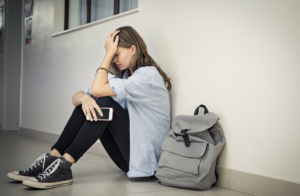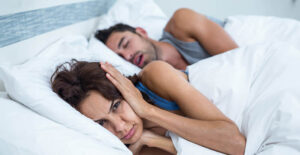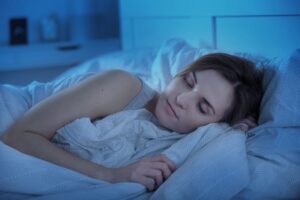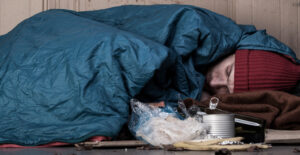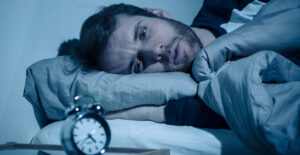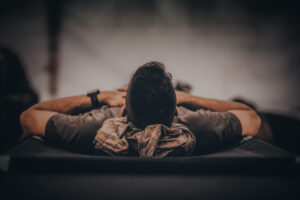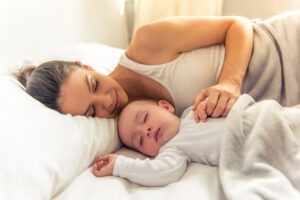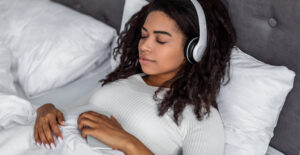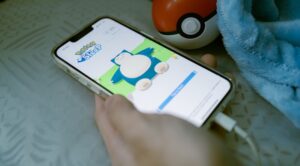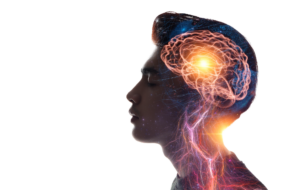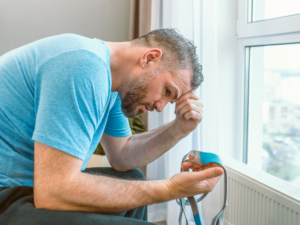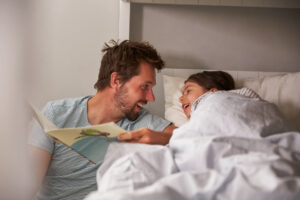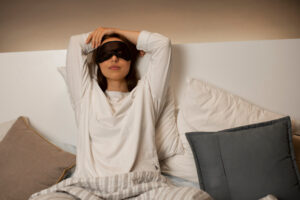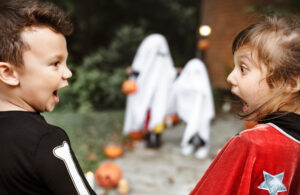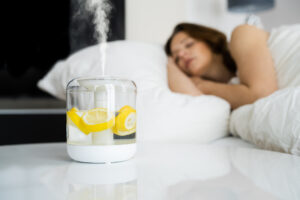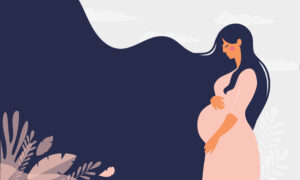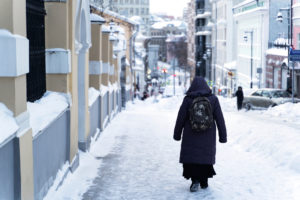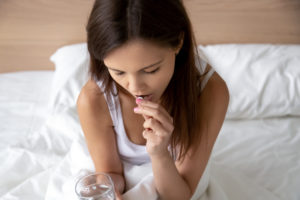One-Third of Us Lose Sleep to the ‘Sunday Scaries.’ Here’s How To Get It Back
- Sunday is the hardest night of the week to fall asleep.
- 79.5% of adults say they have had trouble falling asleep on Sundays compared to other days of the week.
- 33.2% of adults ages 18 to 41 say they often or always have trouble sleeping on Sundays.
- 58.8% of adults ages 58 and older say they have trouble sleeping on Sundays.
- Employed people average 6 hours and 47 minutes of sleep on Sundays, compared to 6 hours and 51 minutes on weeknights.
- 54.4% of adults say stress and anxiety are the top things keeping them awake.
It can be tough to get sleep any day of the week. But many of us have extra difficulty on Sunday nights — so much so that these troubles have a name: the “Sunday scaries.”
Also known as the “Sunday blues,” these feelings of dread and anxiety may be quite common. According to the American Academy of Sleep Medicine (AASM) , 79.5% of U.S. adults say they have experienced trouble falling asleep on Sundays compared to other days of the week.
In a separate survey of 1,250 U.S. adults that SleepFoundation.org commissioned in August 2022, nearly 31% of respondents reported that Sunday is the hardest night of the week to fall asleep, far outranking any other day of the week. Comparatively, just 3.6% of people reported Thursday as the hardest day to fall asleep.

Why are we too stressed to sleep on Sundays compared to other days of the week? One study says it’s because Sunday is the unhappiest day of the week. But there may be other reasons why sleep anxiety is so prevalent on Sundays.
What Makes Sunday So Scary?
Sunday scaries aren’t unique to any specific group. They show up regardless of age, gender, or socioeconomic status.

According to the SleepFoundation.org survey, every age group identified Sundays as the most difficult day to fall asleep. It was No. 1 among men (31.6%) and women (30.4%).
There is a generational difference, however. Some 33.9% of millennials, ages 26 to 41, say they always or often have trouble falling asleep on Sundays, with 31.9% of Generation Z sleepers, ages 18 to 25, reporting the same, according to the AASM . Meanwhile, only 9.6% of baby boomers, ages 58 to 75, say the same. No adults ages 76 or older reported these issues.

The term “Sunday scaries” itself also reveals a divide, as 64.7% of SleepFoundation.org respondents weren’t familiar with it. Only 18.2% reported that they knew what Sunday scaries refer to.
According to the SleepFoundation.org survey, every age group identified Sundays as the most difficult day to fall asleep. It was No. 1 among men (31.6%) and women (30.4%).
The dreadful feeling that comes with Sunday scaries, however, does seem to coincide with anticipation for the beginning of the work or school week.
“Sunday scaries are essentially a form of performance anxiety, much like before a test or a presentation,” says Dr. Alex Dimitriu, founder of Menlo Park Psychiatry & Sleep Medicine in Menlo Park, California, and a SleepFoundation.org medical-review board member. “Part of it is natural, but it can also be too much, leading to stress, insomnia, and a worsened night of sleep.”
Dr. Harold Hong, a board-certified psychiatrist and medical director at New Waters Recovery in Raleigh, North Carolina, agrees.
“The weekend is typically the only time people can relax and enjoy some well-deserved leisure time,” he says. “So for many, the thought of returning to a hectic work or school schedule on Monday morning can be pretty daunting, resulting in Sunday sadness or depression.”
Among adults that SleepFoundation.org surveyed, 54.4% identified stress and anxiety as the cause of their sleep difficulties. That number shot up to 61.6% for those who experience Sunday scaries. About half of all respondents who experience these symptoms (50.1%) say they start before 5 p.m. Sunday.

Factors Contributing to Sleep Anxiety and Stress
There are several reasons why we might experience stress and anxiety and can’t fall asleep. Survey respondents zeroed in on three primary reasons: worrying about the next day (57.2%), job or employment situations (43.8%), and family (41.3%).
“Sundays can be scary at times because of the anxiety related to responsibilities I anticipate on Monday mornings,” says Haley Brothers, founder of Weekend Made Sleepwear in Seattle. “It’s easy to get wrapped up in recurring thoughts about the many things that need to get done to make Mondays a success.”
Brothers isn’t the only one struggling with recurring thoughts and worries about the beginning of the week. Among SleepFoundation.org survey respondents who say Sunday is the hardest night to fall asleep, 63.9% cite next-day worries as a key factor in their Sunday scaries. Some 55% of them link these worries to their employment.
“When you work long hours in tough conditions every day of the week, it’s easy to dread Monday mornings,” says Tom Monson, owner of Monson Lawn & Landscaping in St. Paul, Minnesota. “That has always made sleeping on Sunday nights much harder.”
Trouble falling asleep on Sundays can lead to less sleep, especially for those starting their work week on Mondays. Employed survey respondents reported getting 6 hours and 47 minutes of sleep on Sunday nights, which is four fewer minutes than they get on average Monday through Thursday nights. With fewer worries on their minds, they get the most sleep on Saturday nights.
This may be a direct consequence of the bidirectional relationship between stress and sleep . That is, stress from the work week prevents sleep, while sleep deprivation also increases stress creating a continuous cycle of sleep deprivation and increased stress.
This wasn’t the case, however, with students. They reported getting 6 hours and 54 minutes of sleep on Sunday nights, more than the 6 hours and 36 minutes they get on weeknights.
Among 18- to 24-year-olds who say Sunday is the hardest night to fall asleep, 55% say school or studies is what keeps them up — the largest share for that answer among age groups.
3 Tips For Beating the Sunday Scaries
Whether Sunday scaries are the result of work, school, or other factors, these tips can help reduce stress and anxiety to help sleep come more easily.
1. Plan for the week ahead
“Map out a plan for the week, so you know what to expect and can better prepare yourself mentally and emotionally,” Dr. Hong says. “This may involve creating a to-do list of all the tasks you need to complete for the week and scheduling time for leisure activities and relaxation.”
Planning ahead is a form of proactive coping, or taking action to prevent stress later. Those who participate in proactive coping have lower levels of stress and depression.
2. Prioritize good sleep hygiene
Sleep hygiene refers to optimizing your sleep environment and any routines or rituals you participate in to get ready for bed. Having a consistent bedtime, following a similar bedtime routine, and preparing an environment that is conducive to sleep are key components of good sleep hygiene.
Oliver Zak, Los Angeles-based CEO and co-founder of tattoo-care company Mad Rabbit, says he has a Sunday-night ritual of “turning off” his brain before bed.
“So long as my brain isn’t obsessing about events of the week by the time my head hits the pillow, it becomes like any other night of sleep,” he says.
3. Do something you love
Another way to combat Sunday scaries is to spend your downtime on the weekends doing things you enjoy. Increasing your leisure time can counteract stress and improve your mood , studies say.
“Savor a good cup of joe, curl up with your favorite book, or go on that hike you keep putting off,” Dr. Hong says. “But if having a much-needed rest over the weekend is what you’re after, then, by all means, do just that.”
Methodology
The survey commissioned by SleepFoundation.org was conducted on the online survey platform Pollfish between Aug. 26 and 27, 2022. Results are from 1,250 survey participants who were ages 18 and older and lived in the United States at the time of the survey. All attested to answering the survey questions truthfully and accurately.
References
5 Sources
-
American Academy of Sleep Medicine Sleep Prioritization Survey 2022: Sunday Scaries. Feb. 17-24, 2022., Retrieved September 14, 2022.
https://j2vjt3dnbra3ps7ll1clb4q2-wpengine.netdna-ssl.com/wp-content/uploads/2022/07/sleep-prioritization-survey-sunday-scaries.pdf -
Csikszentmihalyi, M., Hunter, J. Happiness in Everyday Life: The Uses of Experience Sampling. Journal of Happiness Studies 4, 185–199 (2003)., Retrieved September 16, 2022.
https://link.springer.com/article/10.1023/A:1024409732742 -
Slavish, D. C., Asbee, J., Veeramachaneni, K., Messman, B. A., Scott, B., Sin, N. L., Taylor, D. J., & Dietch, J. R. (2020). The Cycle of Daily Stress and Sleep: Sleep Measurement Matters. Annals of Behavioral Medicine, 55(5), 413–423., Retrieved September 15, 2022.
https://pubmed.ncbi.nlm.nih.gov/32756869/ -
Polk, M. G., Smith, E. L., Zhang, L.-R., & Neupert, S. D. (2020). Thinking ahead and staying in the present: Implications for reactivity to daily stressors. Personality and Individual Differences, 161, 109971., Retrieved September 15, 2022.
https://www.sciencedirect.com/science/article/abs/pii/S0191886920301604 -
Qian, X. L., Yarnal, C. M., & Almeida, D. M. (2014). Does leisure time moderate or mediate the effect of daily stress on positive affect? An examination using eight-day diary data. Journal of leisure research, 46(1), 106–124., Retrieved September 15, 2022.
https://pubmed.ncbi.nlm.nih.gov/25221350/


